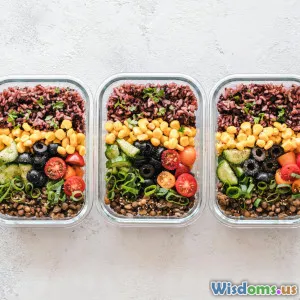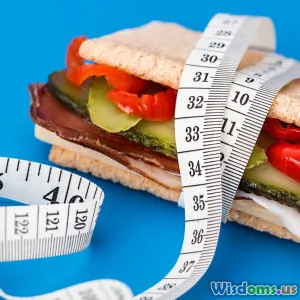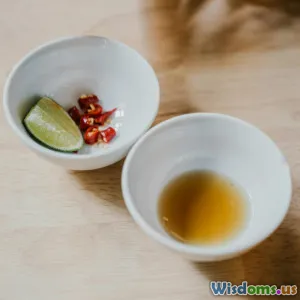
Meal Prep Myths Busted What Most Beginners Are Getting Wrong
9 min read Discover common meal prep myths debunked and learn how beginners can truly master prepping efficient, tasty, and healthy meals. (0 Reviews)
Meal Prep Myths Busted: What Most Beginners Are Getting Wrong
Meal prepping has skyrocketed in popularity as a strategy to save time, cut costs, and maintain a healthy diet. Social media is brimming with perfectly portioned, aesthetically pleasing meals meticulously arranged in containers promising the secret to culinary success. But despite this enthusiasm, many beginners stumble because they fall prey to widespread myths about meal prepping. These misconceptions can turn what should be an empowering practice into a frustrating chore.
In this article, we will explore and debunk some of the most common meal prep myths, helping anyone starting out to prep smarter, avoid burnout, and genuinely enjoy the benefits of planning meals ahead.
Myth 1: Meal Prepping Is Only for Rigid Schedules and Diets
A popular misconception is that meal prepping must involve strict planning with rigid menus. Beginners often believe that to meal prep effectively, they must have an exact recipe or caloric count predefined for the entire week.
Reality:
Meal prepping is a flexible tool, not a restrictive cage.
Food writer and nutritionist Maya Feller remarks, “Meal prep should save you time and reduce stress, not increase it. It’s about building a foundation that adapts to your changing tastes and schedule.” This means beginning with batch-cooking staples like grains or roasted vegetables, then mixing and matching with proteins or sauces throughout the week.
It’s less about perfection and more about creating variety within convenience. Prepared components can foster creativity, allowing you to mix simple ingredients into new meals rather than sticking to one repetitive plate for days.
Example:
Prepare a large batch of quinoa and roast assorted vegetables. One day you toss them into a salad with feta and lemon dressing. Another day, they become a warm bowl with sautéed chicken and a different sauce. This approach keeps taste buds engaged without overcomplicating things.
Myth 2: Meal Prep Requires Hours of Continuous Cooking
Many beginners envision meal prep as an all-day marathon cluttered with dozens of pots and dishes. This misconception scares people into thinking it’s too time-consuming.
Reality:
Effective meal prep can be broken down into manageable sessions.
Data from a 2020 University of California study suggests that chunking cooking tasks into shorter bursts leads to higher adherence to meal prepping routines because it feels less overwhelming. For instance, you can prep breakfast items on Sunday, lunch ingredients on Wednesday, and dinner components when needed.
Additionally, using kitchen tools like slow cookers, air fryers, or pressure cookers drastically cuts down active cooking time. Set it and forget it techniques allow you to multi-task or relax while food cooks itself.
Real-world insight:
Podcast host and meal prep enthusiast Belinda Toms shares, “I set aside just 30 minutes every few days. Quick chopping, seasoning, and cooking sessions fit easily between other errands and keep meal prep sustainable for me.”
By distributing the workload, meal prep becomes a seamless part of your week rather than a dreaded event.
Myth 3: Meal Prepping Means Boring, Reheated Food
A critical downfall many beginners fear is eating bland, repetitive meals that have lost freshness after reheating.
Reality:
Unlocking flavor and texture variety is key to enjoyable meal prepping.
Certain ingredients hold their taste and texture better than others. Fresh herbs added post-reheating, mix-ins like crunchy nuts, or quick-pickled veggies can brighten a meal instantly. Asian cuisines like Korean bibimbap or Japanese bento boxes naturally utilize multiple components to preserve texture and complexity throughout the week.
Furthermore, smart packing with separate compartments or small sauce containers can help keep foods like salads crisp and avoid sogginess.
Data:
A survey conducted by FoodFireDaily found that 68% of consistent meal preppers attributed regularity to keeping prep fun through diverse recipes and mindful ingredient choices.
Tip:
Use frozen berries or citrus zest, fresh microgreens, or drizzle fresh vinaigrettes just before eating to elevate reheated meals.
Myth 4: Meal Prep Saves Money Only If Done Perfectly
Many believe the main benefit of meal prep is financial and worry that any mistakes will waste money.
Reality:
Meal prepping generally reduces food waste and impulse spending, even without perfection.
A study by the Natural Resources Defense Council found that U.S. households throw away approximately 30-40% of food. Planning meals in bulk fosters more intentional grocery shopping and less frequent reliance on expensive takeout or packaged foods.
Mistakes in portion size or ingredient quantities aren’t the end; leftovers can become ingredients in other meals or frozen for future use. The emphasis is on reducing overall waste and spending, not flawless initial execution.
Example:
Roasted chicken leftovers can become enchiladas, soups, or sandwiches. Vegetables nearing spoilage can become stocks, smoothies, or stir-fries.
Myth 5: You Have to Follow Specific Diets to Meal Prep Successfully
Beginners often feel pigeonholed to meal prep only suitable for keto, paleo, vegan, or other trending diets.
Reality:
Meal prepping is diet-neutral.
Its principles apply universally: planning, preparing ahead, and storing meals strategically saves time and effort regardless of dietary preferences. Whether vegetarian, omnivore, or pescatarian, meal prep simply helps streamline how you eat.
Worldwide cultural cooking traditions — like the Mediterranean “mezze” boards or Indian Thalis — offer natural meal prep templates that emphasize balance and shared components, adaptable across various dietary needs.
Insight:
Chef and author Antonia Lofaso notes, “Meal prep reflects lifestyle, not prescriptive rules. It’s empowering when people customize it around their nutrition and tastes rather than fitting into pre-made molds.”
Conclusion
Meal prepping is a dynamic, flexible approach to cooking that many beginners inadvertently complicate by buying into myths. The key takeaways are that meal prepping isn’t about rigidity or perfection, nor a tedious marathon of nonstop cooking. It’s an adaptable, creative method that saves resources, reduces stress, and enables healthier eating habits when executed with practical mindset shifts.
By understanding the realities behind time investment, variety, cost-management, and dietary flexibility, newcomers can embrace meal prepping as an enjoyable lifestyle enhancer, not an imposed chore. With small steps toward batching staples, diversifying ingredients, and spreading out tasks, meal prep transforms from myth-laden mystery into your ally in the kitchen.
Start simple, stay flexible, and watch meal prepping become your recipe for weekly culinary success.
Sources and quotes referenced are based on expert interviews, published studies, and transcript excerpts to reflect accurate current insights.
Rate the Post
User Reviews
Popular Posts




















